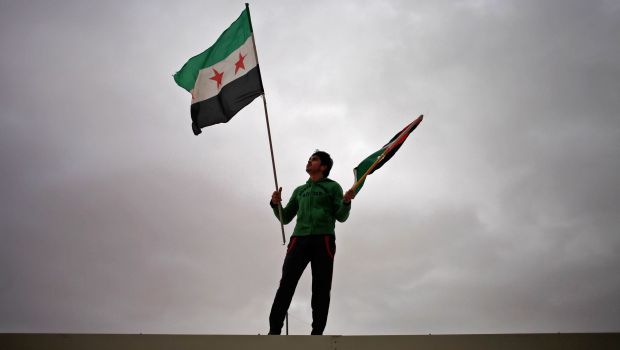The Syrian crisis was one of the most prominent topics discussed at the 35th Arab summit in Kuwait, which ended earlier this week. This importance does not only stem from the effects the conflict has on inter-Arab relations, but also from the latest Syrian and Arab movements which took place in the run-up to the summit, and the latest developments on the ground and the challenges facing different Arab states in this regard.
Since this is so important, the Syrians must have a voice within the Arab Summit, even if there are a lot of reasons for them to stay away in light of the Arab League’s weak and ineffective dealings with a number of regional issues, particularly the Syrian crisis itself.
The Syrians took the initiative via the National Coalition for Syrian Revolutionary and Opposition Forces, which is recognized as the legitimate representative of the Syrian people. This resulted in the Arab League inviting a Coalition delegation to attend summit, with its leader Ahmed Jarba delivering a speech about what the Syrians want from the organization.
Jarba’s speech focused on reminding Arab leaders about the facts on the ground, most notably confirming that the Assad regime and its allies are waging a devastating war on the Syrian people. He affirmed that this conflict is part of a larger proxy war against Syria, with its aim the subjugation of the Arabs—part of a project targeting Syria in particular and the Arab world at large; a project that the Arabs must not ignore as this would only serve to create new regional conflicts. As for who stands behind this project, Jarba explicitly stated that this was an unholy alliance that includes the Assad regime in Syria, Iran, and extremist militias in Lebanon and Iraq.
He confirmed that the Syrian people are committed to “resisting” the Assad regime and its allies and that they are on the path to victory because the Syrian people’s determination is unbreakable, as are their hopes for freedom and dignity. Syrian rebel forces will never stop confronting Assad’s forces and their Hezbollah ally, he said, in addition to the extremist Islamic State of Iraq and Syria (ISIS). Jarba’s reference to ISIS in this regard can be understood as the Coalition president seeking to differentiate between the Syrian revolution for freedom, justice and equality, and the extremist Islamist groups on the scene, including ISIS.
After describing the situation on the ground in Syria and its external implications, Jarba moved to relay what the Syrian people believe should be relayed to the Arab leaders, calling them to take practical steps to deal with the Syrian crisis. Jarba issued three main calls to the Arab summit: First, he called on the Arab League to “pressure the international community to comply with its commitments with regards to providing sophisticated weapons to our revolutionaries who are giving their lives for the freedom and dignity of the Syrian people and Arabs as a whole.”
Second, he called for Arab leaders to provide “greater humanitarian aid of all forms, to your Syrian brothers at home and in the diaspora who are suffering.”
Third, Jarba called for Arabs to “pay greater attention to the situation of the Syrian refugees in Arab states, particularly those in Jordan, Iraq and Lebanon.” He added: “They are guests in your country who must return to their own country after the end of the current situation [in Syria].”
These key demands were accompanied by two important draft resolutions. The first resolution called for the Coalition to be granted Syria’s seat at the Arab League after the Assad regime’s membership was suspended in late 2011, and after the Arab League officially recognized the Coalition as the legitimate representative of the Syrian people in 2013. This comes after claims about the Coalition’s eligibility to take up the seat were raised last year, prompting it to request this once more earlier this week.
The second draft resolution requested that Syrian embassies in Arab capitals be handed over to the Coalition after the Assad regime has lost its legitimacy and Syrians abroad cannot find anybody to represent their interests. He added that the current state of affairs serves to complicate Syria’s relationship with other Arab countries and is making the situation for Syrians living in other Arab countries even more difficult.
The Syrians, through Jarba’s speech, sought to re-summarize the domestic and external situation that they are facing and remind Arab leaders of details that must not be overlooked or ignored. Following this, Jarba moved to call for practical steps to be taken. He made these calls in the knowledge that the Arab leadership and the Arab League may not be able to implement them; however, it was nevertheless important that he issue these calls openly and clearly. It is not enough to say that these demands should not have been made simply because they will not be implemented or because there are those in the Arab League who will oppose their implementation.
The Syrian people achieved very little at the Kuwait Summit, perhaps just a few words, while the actions that will follow this will perhaps be even less than this—yet we live in hope. However, the important thing is that the Syrian people address the Arab world explicitly and openly. This is important not because Arab states are and will continue to to provide support, but because the principle of Syria’s policy towards the regional and international community is based on such open dealings.
